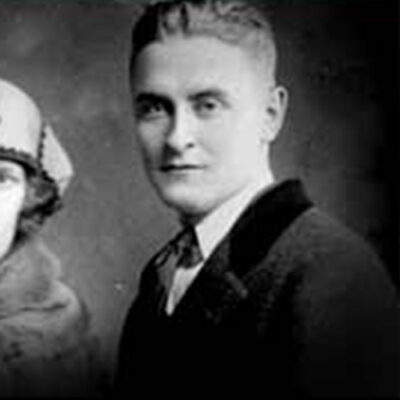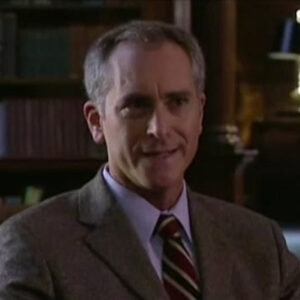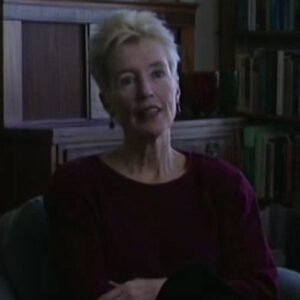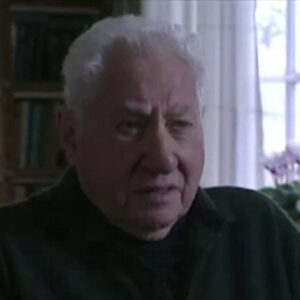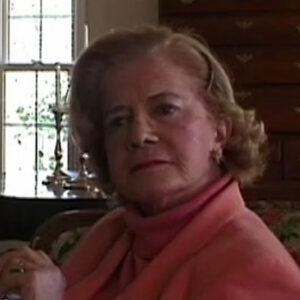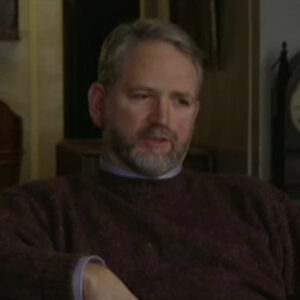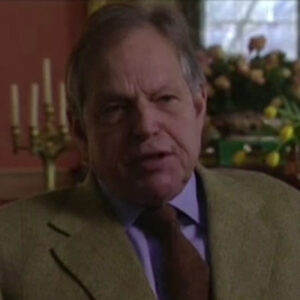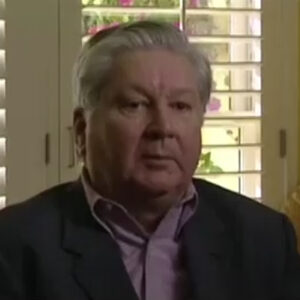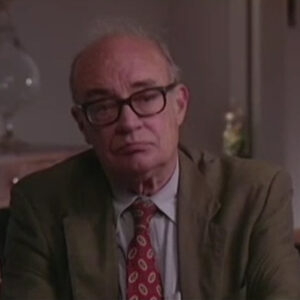Speaker You and I, when we first talked. Now, when I was here the last time. I had the notion that at the at the end of The Great Gatsby when Nick Carraway.
Speaker The narrator.
Speaker Returns to the city in the Midwest that it was kind of a. A triumph for him that he that he had come back and you thought totally wrong. It’s a it’s a defeat. Could you. What was the city he can you can you just give me this around a little bit of the end of the novel and what does it represent? Where was he coming back to that high and a little bit with Fitzgerald’s life. And remember, we got a bit of attention to learn about it.
Speaker OK.
Speaker OK, Scott Fitzgerald used to come back to St. Paul quite often when he was going to school out east. And so he was certainly used to making the train trip through Chicago back to St. Paul. And so when he described that at the end of The Great Gatsby, he certainly experienced that same trip several times when he came back to St. Paul as a a student from the East Coast, he was probably coming back to a town that he thought was somewhat provincial, but yet he had a lot of success here. So it was also very important to him.
Speaker The people he loved, of course, were still here at the end of The Great Gatsby. When Nick Carraway comes back to his Midwest, I think, though, it’s a it’s a defeat for him. I think he feels that he has not been able to make it out east. He has not been able to compete with these people. And it’s possibly because he realizes he doesn’t really want to compete. He doesn’t want to have to do the things that they do in order to be successful.
Speaker And why couldn’t you see that? That we can always return as kind of a triumph of his own morality? In other words, that he that this Scot was actually saying that this game is pretty, the old money trying to play by the old money game. It’s just not worth it. It’s not right. There’s something more important in life, again, placing me where we are at the end of the novel.
Speaker For Nick Carraway, coming back is one thing, but of course, we have to understand that at that point, Fitzgerald never did come back to St. Paul.
Speaker So he was he was by that time a product of the of the style of life about which he was writing.
Speaker When Fitzgerald has Nick Carraway, we turn from the East Coast to the Midwest at the end of The Great Gatsby. I think just what you said he was giving up. And I think Fitzgerald realized that when he wrote that particular ending. I don’t necessarily see it as a defeat either, but it’s certainly not a victory. He’s he’s coming back to his moral center, but it’s coming back to a moral center that has not triumphed. He felt that he could do something. Fitzgerald felt through the novel that he was showing Carroway trying to do something. But I think in the end, Fitzgerald decided that Nick wasn’t able to do it.
Speaker And this middle Western mentality that we I once very recently said to you, you know, I just I haven’t found a really.
Speaker Coherent connection between Scott and the Catholic Church and, you know, the board of experts and someone said you’ve got to you’ve got to account for that. And is there is there. Did the Catholic Church have an effect on Scott Fitzgerald?
Speaker Well, one thing I think here in your hometown.
Speaker Well, one thing people often don’t associate with Fitzgerald is the Catholic Church. He was the first successful Irish Catholic novelist and he grew up in a town of St. Paul, Minnesota, where it was OK to be Catholic. They were not discriminated against because there were so many Catholics in St. Paul. At one point, approximately 70 percent of the population was Catholic. Fitzgerald had impeccable Catholic credentials on both sides of his family, and the McQuillen of St. Paul were certainly in the middle of everything that was happening with the Catholic Church in St. Paul. They donated money to the church, the convent and the visitation his parents used to take him to recite to the nuns. He grew up wanting to be an altar boy, wanting to be a priest. Certainly there was a huge impact on his life and then on his fiction, the Catholic Church had a huge impact on his life and fiction and.
Speaker Was there guilt connected with this? I mean, was there I mean, when we first talked, you said to me it’s guilt this this guy had. And if you could just answer one thing for me, let’s assume I’ve never seen Saint Paul. And right behind you is this gigantic dome, if you could describe that and its relationship to the community and the also wanting to be an altar boy, you have that experience. So what is the juxtaposition of physically the Catholic Church in this place that we don’t know? And.
Speaker And it’s imperative on his butt of who he is. That was enough.
Speaker I’ll let Fitzgerald describe the church. Actually, he described it as the massive white bulldog on the Hill. And and I think that bulldog image was more than just a way of trying to portray this hulking building. I think he also understood the impact of the Catholic Church on on St. Paul. It dominates everything. It’s higher than the state capital. Every place you look from the city, if you look up the hill, you see the cathedral. This had an impact on the young Fitzgerald and certainly throughout the rest of his life had a great impact. He would constantly write about the guilt that he had for doing things that he was known to do. He wrote almost at the end of his life. I love parties, but the Catholic in me feels guilty about them the next day. There are many little anecdotes like that throughout his writing, where he made it very clear the impact of the church on his life and his writing.
Speaker Why did you.
Speaker Pick Fitzgerald or the Fitzgerald, pick you, all the writers you could have really fastened on, what was was there some common denominator for that? What was it what is it about Scott that got you?
Speaker I think Scott was very smart when he made his life an open book. So it’s pretty fascinating. But beyond that, Scott Fitzgerald said, I want to be the greatest writer. I’m going to marry the prettiest girl. I’m going to do this. I’m going to do that. And then he did it. I think the romance of of that ability is just really attractive for a certain kind of person. And I guess I’m that kind of person. I he attracted me by his his setting goals and then accomplishing them. I think that’s and those goals were somewhat romantic. They weren’t about making money. They weren’t being a captain of industry. They were about being an artist.
Speaker Catholic Church altar boy. Scott was a really strict father.
Speaker He had a puritanical core, and yet he was a horrendous drug, a terribly bad guy. A lot of the time it seems like an enormous paradox. Do you think there is a paradox? And could you help me out with getting my question out of here? How does the Catholic Church tie into that this double the simultaneous double standard of Scots?
Speaker I think Scott was very strict here. He brought his daughter up very, very strictly. He was very concerned that she did not get involved in theatre.
Speaker He was very concerned that she didn’t date the wrong kind of boys. He when he was sober, he wrote letters telling people, you know, how they should, you know, lead their lives and and what they should think. But he inherited a weakness for alcohol from his father. And when he drank, he did he did a lot of things that he wasn’t too proud of the next day. And so consequently, there was this dichotomy. But it was not the only dichotomy in his life. And I think the fact that he recognised these dichotomies and could put them into his literature made him a stronger writer. I mean, the dichotomy between the party animal and the guilty Catholic on Sunday was one the dichotomy between the man who basically had as much money as he probably wanted most of his life, but yet who felt ashamed of his parents was another. So there were these dichotomies that he was able to capture in his writing and did the Catholic Church.
Speaker He felt comfortable as a Catholic, but did he feel comfortable as a follower of Catholic teaching or defining?
Speaker Again, by the time Fitzgerald left Saint Paul in 1922, he had pretty much fallen away from the Catholic Church. But to say that you’ve fallen away from the Catholic Church and then really do it are two different things. So that so the Catholic Church remained with him.
Speaker You described to me as if I haven’t seen it. What is this physical set up of there? Kind of these twin peaks around here? As I was I was trying to figure out what am I doing?
Speaker What am I would say to doing here with Scott? And the Twin Peaks were sort of there’s this gigantic cathedral dome.
Speaker And there’s the James Jim’ll, James Hillhouse right here and then.
Speaker And the Catholic Church is looming over that famous house on Summit Avenue and just a block away the Fitzgeralds, can you give me the physical and social layout, just as if I hadn’t seen it and when this kind of represented first for Scott.
Speaker Sure.
Speaker Fitzgerald was born in St. Paul in 1896, but his father became a soap salesman and they moved to Buffalo, New York, and they lived in a couple of various places in New York. They came back to St. Paul in 1988. At that point, the cathedral was being built. The James J. Hillhouse was already here. And a third important landmark for Fitzgerald would have been the Civil War statue that is is just over by the cathedral as well.
Speaker And Fitzgerald came back to a St. Paul that he really didn’t know because he moved out when he was very young. And yet these three architectural icons would become very important in his life and in his writing. Summit Avenue starts at the St. Paul’s Cathedral and it runs a couple blocks down and then it turns right and runs another three miles to the Mississippi River as it runs as it runs through the crest of the hill. He often called it Crest Avenue. In his short stories. It goes by some of the most magnificent homes, not only in Minnesota but also in the United States. And when Fitzgerald returned to this neighborhood, it was a very small, contained neighborhood, as it still is today. He would certainly recognize the neighborhood if he came back to it. And it was anchored, as I mentioned, by the St. Paul Cathedral and the James Jay Hillhouse. Both of these loom over St. Paul and they were very representative Scott Fitzgerald, representative of the Cathedral of St. Paul, represented to Fitzgerald his strong Catholic ties, his morality, the fact that he helped people all the time. And the James Jay Hillhouse represented to Fitzgerald, I think the America the American dream, much like his grandfather, James J. Hill came to St. Paul in the mid 50s and worked his way from nothing into the Empire Builder. And I think Fitzgerald saw that as an American dream, the Western dream. And one of the things that people say about Great Gatsby is the fact that Fitzgerald recognized that in the end, the people who made their money in the West would go back east just like Jay Gatsby was Scott, in Scott’s own mind, on the right side of the tracks.
Speaker So that avenue was he was he socially conscious of his position in life? And how do you feel about himself here?
Speaker Do you think one of the things I was able to do probably going on 20 years ago now is to interview several of the people that knew Fitzgerald who lived in the neighborhood. Most of them would say that there was no right side or wrong side of the tracks in this very small, contained neighborhood. But I think there was a little bit of that. And Fitzgerald was conscious of the fact that his family always lived on the edge of of Summit Avenue and Summit Avenue society. Scott himself was accepted into this society because he was very bright. He was charming, he was handsome, he was fun. He was witty. And so he made friends very, very easily. But yet he recognized that the most the businessmen looked down on his father because he didn’t have a job. People looked down on his mother because she was a little bit strange and he knew this. And so consequently, he realized that he was both inside the Summit Avenue society. He was friends with the people who lived in the houses on Summit Avenue. He went to parties in their homes. But yet he was also at the same time on the outside because his parents hadn’t quite been able to crack that society the way that he had.
Speaker There always seemed to it seems to me to be a sense of an outsider and Scott, there’s a sense of belonging. Of dreaming for something that sometimes is achieved and isn’t but what was? He’s an outsider from what what did he really want? Not vis a vis St. Paul only, but what did Scott really want? What what was his self-consciousness? What was the core?
Speaker I think part of that longing that people see or read when they delve into Fitzgerald’s works is partly consciously made up because there was actually very little I don’t think Scott could get that he wanted.
Speaker But yet I still think there was that longing in him. He wanted to be popular. He wanted to be a success. And he could articulate that. However, the ways that he chose to be popular and chose to be success, the same ways that many people try to do those things today, sometimes he wasn’t so successful that he wanted to be, for example, a great football player. And he went to Princeton thinking he was going to be a great football player and he failed miserably. He wanted to be a great playwright. And so even though he was a successful short story writer, he wanted to be a playwright and he failed miserably. So in one way, he succeeded beyond even perhaps, well, not beyond his expectations, because he wanted to be the greatest writer in the world, but in other ways, in ways that he wanted to succeed. He he didn’t.
Speaker The first girl he fell in love with, Ginevra King. He met her in St. Paul and she dumped him and he never got over that. He kept notebooks of Ginevra King’s social life, just as Jay Gatsby did in The Great Gatsby.
Speaker Was she was he aware of her different social position using her name?
Speaker One of the things that was very clear back then was the social standing of debutantes and Ginevra King’s social standing at the time he met her was extremely high. She was very, very attractive. She was from a very, very wealthy family. And in fact, that family would go on to kind of be a model for the Buchanans in The Great Gatsby. Tom Buchanan, Ginger King’s father, Charles King on Polo Ponies. They live in Lake Forest, just like Tom Buchanan does. And so I think Fitzgerald realized that she probably was out of his class.
Speaker And if she if he didn’t realize it when he was told that poor boys don’t marry rich girls, he certainly realized it by that point, even though Fitzgerald, by any standard, could not have been considered a poor boy only by the standards of the Kings. And by the way, John never went on to marry Billy Mitchell, the famous Air Force pilot.
Speaker So she continued to stay in a pretty high social circle, telling me who they are, where would the maquilas, where were his father, and say in terms of St. Paul society and what I think at least got a huge self-consciousness. Where were they? Who are they and where were they when mom and dad?
Speaker Yeah, F. Scott Fitzgerald, grandfather on his mother’s side, Philip McQuillan. Scott would have been called Potato Famine Irish. He basically I think he was born in Indiana. He moved to Galena, Illinois. He ran around with the same people that Ulysses Grant ran around with. And basically Fitzgerald would use Grant in his writing many times later on, Philip came up the river. In the mid 50s, he started working as a penniless worker on the docks. He apparently was able to turn his ambition into success because he eventually bought his own building and was able to do very well in St. Paul. And he was one of the more wealthy men in St. Paul. He contributed largely to the growth of St. Paul, to the growth of the Catholic Church in St. Paul. But yet Fitzgerald still could recognize that there was a certain kind of of prejudice against Roman Irish Catholics in this country and still a little bit in St. Paul, perhaps. And so he certainly grew up with somewhat of a chip on his shoulder. And he wrote about it. I mean, he said he spent his life groveling in front of maids, for example, because he I think he always felt that he needed to be not only as good as but better than people in order for them not to look down on him and his family’s humble beginnings.
Speaker Was he ashamed of his mother or his father? There’s a kid here in St. Paul.
Speaker Do you think Scott’s father was not very successful? He was a snappy dresser. He had impeccable manner about him. And so I think Fitzgerald really liked that. And but yet he also recognized that his father was looked down upon because he had failed at business. His mother he was ashamed of you often said it. And in fact, it’s it’s hard to tell that he even ever regretted feeling ashamed of his mother, although he certainly recognized the fact that without her, he would not have been who he was. She was the one that gave him the entree into St. Paul Society. But yet she dressed funny. She had strange habits. She would Scott’s friends and made fun of her. They called her messy Molly. She wore two different kinds of shoes because she said it was easier to break them in that way. So Fitzgerald was definitely a little bit ashamed of his parents.
Speaker But could he be accepted? As you know, we’ve done this, you’ve got this. But can you be accepted as a Catholic?
Speaker But was it a problem being poor Irish Catholic or what sometimes called black, black, black, black, Irish black guy?
Speaker What are the names and what was he aware of, that declension of Catholicism?
Speaker Yeah, he called himself Potato Famine Irish. He called himself Black Irish. He recognized that there was certain social stigma attached to this.
Speaker I think for Fitzgerald, he he he had his sights set so high that for the average person, what he accomplished socially in this city and what his family accomplished socially is certainly they were at the pinnacle of society. His aunt Annabel was a maid of honor at James Jagels daughter’s wedding. And James Cahill represented the pinnacle of St. Paul society. He went to parties with James JGL son. So he certainly made it. But yet he wanted to more than make it. I think he wanted to be it. And so consequently, maybe he felt a little bit defeated when he couldn’t have everything he wanted, such as Ginevra King, who he met in St. Paul and was part of for a Slave Society.
Speaker And so he certainly could have felt a little bit let down, but most people would have considered most of everything he did a success.
Speaker When Zelda came here, which you think of it, Zelda is single again, putting us in the Arctic. Think of what’s St. Paul like in the world. You think of it.
Speaker Scott and Zelda came to St. Paul basically so that Zelda would have a place to stay while she had her baby. And it was it was OK. They got here in the summer and they stayed out at White Bear Lake. They did a little bit too much partying and then they moved down to the St. Paul Hotel. This is getting on toward October. Eventually, they moved to the Commodore, which was another apartment hotel. And from there, Zelda went to Miller Hospital to have her baby. A friend of Scott’s got them a house on Goodrich Avenue a few blocks off Summitt and Zelda was basically trapped in the house. She did have someone to take care of the baby. But the November after she got out of the hospital, there were five days of sunshine. And this is a girl from the south. It was cold. She didn’t have a lot of friends. People didn’t appreciate her southern manners and she did not like it. She thought Saint Paul was the Antarctic. Was it sure, St. Paul’s brutally cold in the winter and and and Scott tried to get her involved in the St. Paul kind of winter activities, bobsledding, they would have bob parties try to you know, he would have he would put on plays for her. He would he would try to cheer her up with these activities. But the bottom line is St. Paul Winters can be very long. That can be very harsh. And he was down with his friends at Kilmarnock bookstore and she was in the house with no one. And she started to go a little stir crazy, probably half his life.
Speaker He was going broke. What do you what do you mean he invented. He did. He invented himself. Yeah.
Speaker Author James Mello wrote an interesting way. Maybe it was the same smell. Okay, I’m sorry. There’s a yeah, I know. I know.
Speaker Scott Fitzgerald, I think, was able to fool people and con people into thinking that he was this poor little boy from the Midwest who really didn’t have much opportunity in life. But yet that’s not true. He came from money. Now, it certainly isn’t the kind of money that the James J.
Speaker Hill family had, but his folks were, you know, I mean, his mother in the McAllen’s were relatively well-off. I mean, I think when his grandmother died, the family inherited something like 100000 dollars.
Speaker That’s a lot of money. Back in the 20s, he was able to go to Princeton. He didn’t ever really have to work in his life except for a couple of days. He got a job at James J. Hills Railroad and was promptly fired because he really had no, you know, physical work habits. And so I think he was able to make people believe that he was this outsider that was competing with people who had a lot of money. And only by his grace and charm was he able to, you know, make it into the society now saying that it is true that by his grace and charm, he was able to make it into this society. But if he really had been the poor kid, no amount of grace and charm would have made him part of that Summit Avenue elite. He went to the right schools. He went to dancing class. These are not the things that, you know, the poor little Irish kid living down the hill is doing. And so Fitzgerald did have that entree and that entree was provided by his mother and his mother, even though she was a little bit crazy on knew this and she was able to propel her son.
Speaker And in fact, the the one child out of four at that point who had lived the other three had died and she just doted on him and she wanted to make sure he had everything and she was able to give him that.
Speaker Did Scott the reweight, he I think that Scott felt like an outsider instead of just calming people. I mean, I think inside he felt that he wasn’t quite acceptable in his life.
Speaker He wanted he wanted to be part of an East Coast kind of aristocracy or something or someone. So was it a con job or was it an internal threshold? That was sort of.
Speaker A bit so high, what do you think?
Speaker He definitely, you know, sought to be a part of a certain kind of intellectual aristocracy. And I think that’s another thing that he really liked about the church. He saw the cardinals and the bishops as this kind of Roman Catholic kings and princes. And and he really liked that. He liked the pomp. He liked the he liked the ceremony and the grandeur. And he he saw himself in that way. Now, certainly, he didn’t quite achieve the kind of X I won’t say acceptance, but the kind of money or the kind of entree that only the most elite achieve in this country. But because he didn’t quite make it to the summit, I don’t think I shouldn’t say that because he didn’t quite make it as high as he wanted to get. I don’t think that necessarily means that he was an outsider. Did he see himself as an outsider? Sure. But I think that was just part of him telling himself that and the rest of the world that even though he really had many advantages that most people don’t normally have.
Speaker What do you think he thought of St. Paul? I mean, I have the impression that he thought of St. Paul as kind of the whole joint as the wrong side of the tracks. And he wanted to go. I thought he wanted to go out east. I think that here. What about that? What do you think of St. Paul?
Speaker And I think Fitzgerald, like with most things, had kind of a love hate relationship with St. Paul’s, probably a little too strong, but I think he admired eventually grew to admire the kinds of friendships that were here. They weren’t phony. They were very strong. They were very rooted. And I think that’s one of the things he’s saying at the end of The Great Gatsby, he’s coming back to a place that’s rooted that’s not phony. I think he some of the people he met here, he continued to write the rest of his life. He continued to insist that he was going to come back to St. Paul and bring his family here. He never made it, but he kept saying that. And I think he meant it. He just never made it back. He found he liked to tease St. Paul. I think he thought it was provincial.
Speaker But I think he I think he really did in a certain way appreciate his growing up here, because I think it gave him a really grounded start in life that really served him well.
Speaker In addition to morality.
Speaker Of the church, you said to me, are you kidding? He didn’t have a connection with this church, it was a moral imperative that was always looming over him and he was failing guilt, guilt. Can you help me with that? Was there was there guilt? You know what he’s talking about yourself.
Speaker Yeah.
Speaker As a Catholic myself, I certainly understand Catholic guilt. And I think Protestants tell me it’s similar to Protestant guilt. Fitzgerald grew up with a rigorous work Catholic ethic that you can see in his own life and writing. And he grew up with a real solid moral center. But yet there was something in him that wanted to, you know, tweak that and tease that and and challenge it. And even though you’re tweaking and teasing and challenging and doing things that you probably weren’t supposed to be doing, you never grew out of the feeling that somebody is watching you and that you have to go to confession and that you have to tell your sins to someone else to be forgiven in the Catholic Church. You just can’t go to God. You have to go to to do a priest. And I think Fitzgerald always had priests in his life. If it was Hemingway or John Peel Bishop or someone, there was someone there that Fitzgerald always felt he had to confess to.
Speaker Did he did he like did he need to confess? Absolutely sure.
Speaker Without confession, there is no forgiveness. And so consequently, he he was compelled to confess. He confessed in his own writing them that there are very, very few things in his life that he didn’t, you know, paint for the world to see. Part of those probably felt in some ways like confessions. And certainly he would write tons of letters to people confessing things and, you know, saying I did this and I’m sorry and I was wrong and please forgive me.
Speaker It and it was it was more than, I think, typical. I think it had to do with the fact that he grew up this very strict Catholic.
Speaker Is that also Saint Paul is there is there I of course, think of it now. I think of Minnesota as a Lutheran place. But is is the sense of the is there something about the St. Paul Catholic tradition that what I don’t know that there’s national public or is that not, Scott?
Speaker I don’t think it’s a St. Paul Catholic tradition, I think it’s just a Catholic tradition.
Speaker And St. Paul happened to be so highly Catholic, the Catholic Church so dominated St. Paul that had grown up in another city. Even if his family would have been as Catholic, he wouldn’t have seen it quite the same way that you see it. Here it is everywhere you you see the you know, the cathedral looming over everything. And Fitzgerald understood that. And he may not have understood it as a young man growing up, because this is really all he kind of had to judge it with.
Speaker But certainly later on in his life, it would have occurred to him that he grew up in a place that was, you know, very dominated by the Catholic Church.
Speaker Was you, Dave Page or you yourself an academic when it comes to Fitz-Gerald, an academic, a fan, a little of both. How do you classify you classify yourself? A vis Fitz-Gerald? You know, a hell of a lot.
Speaker I can tell you that, you know, but I guess in some ways I’m a Fitz-Gerald groupie. I, I think like many people, I was attracted by his beautiful writing. And then I became really enthralled with his life. He set goals for himself and he accomplished them. He was he was an incurable romantic. He always thought that he was capable of more and doing better. He thought he was capable of achieving the highest. And in many ways he did. And and so that started to attract me to want to learn more about him, not just about his writing.
Speaker And so I teach Fitz-Gerald in college classes. I, I read a lot about him, I, I study him. I travel around looking at his papers and his works and I it’s it’s a hobby that will probably stick with me.
Speaker My life groupie.
Speaker Not an expert, not academic groupie.
Speaker Yeah. There’s I think Fitzgerald’s probably one of the few authors that you could probably say there are Fitzgerald groupies and and it’s partly it’s tongue in cheek for me but but partly not.
Speaker So I, I find myself attracted to the glamour as much as that as the academic side. Certainly if he were not as good of writer, I would not be as enamored. But that’s just part of it. The aura around his life is also part of the attraction with as much energy as you can muster his st.paul.
Speaker This is something I just don’t know, except it’s got I mean, the guy was a bad actor. A lot of Saint Paul thought. Plus his reputation has been up, down, around, just like a sculpture that I you and I talked about. His Saint Paul accepted the film.
Speaker I moved to St. Paul about eight years ago.
Speaker I moved to Minnesota maybe twenty years ago, and I was shocked at the way that St. Paul treated Fitzgerald. There was basically nothing in this town named after him. There was no museum. There still is no museum. And I was surprised by that because I thought that, as you know, any kind of city would grab on to his reputation if for no other reason, you know, tourist dollars. But yet there’s something about Fitzgerald that Saint Paul is not really able to 100 percent say that he is our native son and we’re proud of him. They don’t do that. And practically every time in fact, I’ll say every time I read about him in the newspaper, they always preface it with an adjective drunken F. Scott Fitzgerald, the you know, the guy drank here, the guy got drunk here. The guy a it’s exaggerated and mostly untrue.
Speaker He was very, very hard working when he lived in Saint Paul and and be, you know, get over it. I, I think it’s time that, you know, Saint Paul kind of is started to be a little bit more proud of of his accomplishments and not be so concerned about what he did Saturday night.
Speaker The Catholic Church in Rockville, Maryland, wouldn’t let him into the graveyard.
Speaker Then he got really big, so big that they’d let him in the years after he was corrupt and then the Protestant cemetery. Any analogy? Is that true, by the way?
Speaker And when Fitzgerald was first buried, he was buried in a Protestant cemetery in Rockville. He wanted to be buried next to his parents, but the Catholic Church wouldn’t allow that. The Archdiocese of Washington, D.C., finally expanded, as far as I understand. And in 1972, he was allowed to be reburied in the Catholic cemetery. The Catholic Church was very quick to explain that there was no reason why he was kept out, but he was kept out. So there must have been a reason. St. Paul, I think, in a very, very similar way, really has done very little to acknowledge Fitzgerald. Garrison Keillor in 1996 kind of shoved Fitzgerald down the city’s throat and he he got a statue erected. He got the theater name changed. But if it weren’t for Garrison Keillor, I don’t think anybody else would have done that.
Speaker Why?
Speaker Politically, he’s still a person that many people recall as some kind of no good person, he he drank, he caroused, he had extramarital affairs. And for some reason, Saint Paul is just unable to forgive him for that. I asked once someone, you know, why is it that Saint Paul has this feeling about Fitzgerald? And I was told they could forgive him everything except for the fact that he didn’t go to church on Sunday.
Speaker Didn’t he? No, Scott didn’t go to church on Sunday. He’s oh, as a kid he did, but he stopped.
Speaker He stopped going to church pretty soon after his first novel came out. He had by that time, he knew he was still a Catholic and he still had friends within the Catholic, you know, priests and bishops and things. But at that point, he started to have his own kind of personal, more personal relationship with what it meant to be a Catholic rather than having some kind of, you know, rote pattern that you go through. And so he certainly recognized that he could never not be a Catholic, but he didn’t perform the outward trappings. He didn’t go to church. He didn’t take communion. But yet he did also not divorce Zelda. And part of that had to do with the Catholic Church as well. And there’s an interesting passage in The Great Gatsby where Tom Buchanan says he can’t divorce Daisy because he’s Catholic, even though he’s not the mayor. Coleman in 1996 had a little party for the people that were involved in the Fitzgerald Centennial celebration, and he said that he couldn’t accomplish any of this because politically it was just too sensitive that Fitzgerald was still too much of an outsider to be accepted by the city. But yet Garrison Keillor could do it because as a private individual, he just did it. But as a kind of as a city project, it could not be done.
Speaker Any hope for Scott sitting down there now that we got the garbage can, the 300 dollar garbage can?
Speaker I don’t think there’s another thing about St. Paul is you don’t to your own horn. And I think and the other thing is that Fitzgerald left and didn’t come back.
Speaker And so they they haven’t forgiven him for being self promoting. They haven’t forgiven him for not coming back. They haven’t forgiven him for drinking a little bit too much later on in life. And I think by the time everyone is dead who feels that way, there probably won’t be anybody pushing to create anything else.
Speaker But I’d love to see a museum in this town, a Fitzgerald museum. I think Fitzgerald deserves it. I think the city would do well by it.
Speaker I think he is one of the number one tourist attractions in this city next to the Mall of America and maybe now next to the hockey team. But he certainly attracts people from all over the world who come here on their own without any kind of push from the city.
Speaker Which Scott. See, humor and irony in the fact that he is now right up there with the Mall of America.
Speaker I think Scott would have been very proud to have the theater named after him. And I think he would be very proud that there are some people in this city who think he’s probably one of the most important native sons that we have. And it’s and yet, you know, who knows?
Speaker He may still have said, well, but, you know, it’s just still not quite enough.

